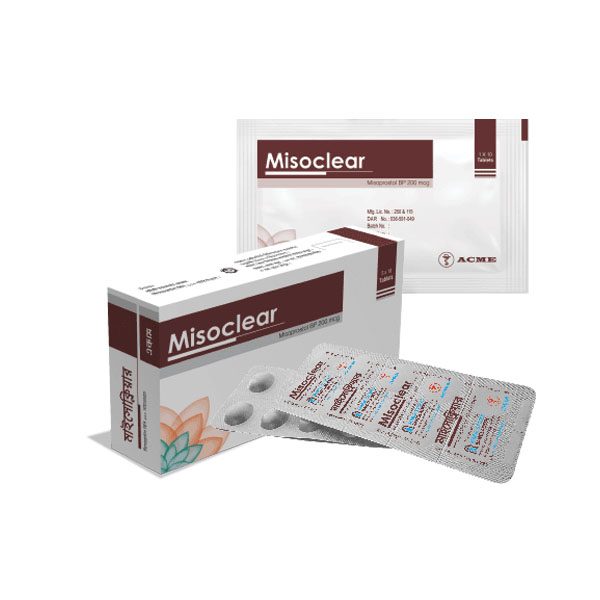
- Stock: In Stock
- Brand: Acme Laboratories Limited
- Product ID: Misoprostol
100% Secure Payment

Misoclear 200 mcg Tab
Indications
Antiulcerant Indication: Misoprostol is indicated for reducing the risk of NSAID (nonsteroidal anti-inflammatory drugs, including aspirin) induced gastric ulcers in patients at high risk of complications from gastric ulcer, eg, the elderly and patients with concomitant debilitating disease, as well as patients at high risk of developing gastric ulceration, such as patients with a history of ulcer. Misoprostol has not been shown to reduce the risk of duodenal ulcers in patients taking NSAIDs. Misoprostol should be taken for the duration of NSAID therapy. It had no effect, compared to placebo, on gastrointestinal pain or discomfort associated with NSAID use.
Gynecological Indication: Labor induction (in unfavorable cervical conditions) In the prevention & treatment of Postpartum Hemorrhage (PPH)
Pharmacology
Misoprostol is a synthetic prostaglandin E1 analogue. It protects the GI mucosa by inhibiting basal, stimulated and nocturnal acid secretion and by reducing the volume of gastric secretions and increasing bicarbonate and mucus secretion. It also induces contractions of smooth muscle fibres of the myometrium and relaxation of the cervix uteri.
Dosage & Administration
Anti-ulcerant dosage & administration:
The recommended adult oral dose for reducing the risk of NSAID-induced gastric ulcers: 200 mcg Misoprostol four times daily with food. If this dose cannot be tolerated, a dose of 100 mcg can be used. Misoprostol should be taken for the duration of NSAID therapy as prescribed by the physician. Misoprostol should be taken with a meal, and the last dose of the day should be at bedtime.
Renal impairment: Adjustment of the dosing schedule in renally impaired patients is not routinely needed, but dosage can be reduced if the 200 mcg dose is not tolerated.
Gynecological dosage & administration-
Induction of Labor: 25 mcg vaginally 6 hourly or, 50 mcg orally 4 hourly.
Postpartum Hemorrhage (PPH) prophylaxis: 400 mcg to 600 mcg orally or rectally immediately following delivery of the child.
Postpartum Hemorrhage (PPH) treatment: 1,000 mcg rectally or, 200 mcg orally with 400 mcg sublingually.
Interaction
There is no evidence of clinically significant interaction between Misoprostol and cardiac, pulmonary and CNS drugs and NSAIDs. Bioavailability of Misoprostol is decreased with high doses of antacid.
Contraindications
Misoprostol is contraindicated to anyone with a history of allergy to prostaglandins and it is also contraindicated in pregnancy.
Side Effects
Gastrointestinal: GI disorders had the highest reported incidence of adverse events for patients receiving this preparation. It can cause more abdominal pain, diarrhea and other GI symptoms. The incidence of diarrhea can be minimized by administering it with food and by avoiding co administration with magnesium-containing antacids.
Gynecological: Gynecological disorders such as spotting, cramps, hypermenorrhea, menstrual disorder and dysmenorrhea have been reported. Postmenopausal vaginal bleeding may be related to Misoprostol administration.
Elderly: Overall, there were no significant differences in the safety profile in patients 65 years of age or older compared with younger patients.
Pregnancy & Lactation
Pregnancy: Misoprostol is contraindicated to pregnant women.
Lactation: It is not known whether Misoprostol’s active metabolite- misoprostol acid is excreted in human milk. Misoprostol should not be administered to nursing mothers because the excretion of misoprostol acid could cause diarrhea in nursing infants.
Precautions
Precaution should be taken in conditions where hypertension might precipitate severe complications (e.g. cerebrovascular and cardiovascular disease).
Overdose Effects
The toxic dose of Misoprostol in human has not been determined. Clinical signs that may indicate an overdose are sedation, tremor, convulsions, dyspnea, abdominal pain, diarrhea and fever. Symptoms should be treated with supportive therapy.






























